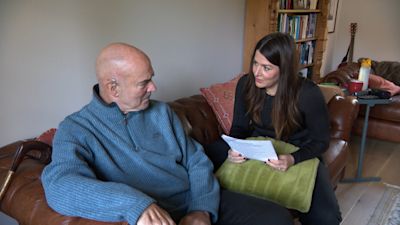Stroke: Multi-lingual dad lost speech amid fears hundreds missing out on 'miracle' treatment

Daughter of stroke survivor describes 'catastrophic' effects amid concerns hundreds missing out on 'miracle' treatment
Stroke survivors and their families are calling for major improvements to services and treatment across Wales.
Charities have described access to one "miracle" treatment as "potluck", and have also raised concerns over the impact of ambulance waiting times.
It comes as the Welsh Government develops a new stroke delivery plan, which is due to be published next year.
Father-of-three Gareth Hale had a stroke in April 2021 and went from speaking three languages to barely being able to communicate and struggling to walk without support.
His daughter, Lisa, had to move back to Wales from London to care for her father, an ex-police officer of 30 years from Bassaleg, Newport.
"Before the stroke dad was so fiercely independent, he lived on his own, he'd go camping on his own, mountain climbing, and then suddenly I have to plan his week out for him," she said.
Lisa continued: "Dad losing his speech, there's no other way to describe it other than for him it's catastrophic.
"To sit opposite my dad and for him to try and speak to me and not be able to - it's like he's there, but he's not there, and that's the hardest thing."
Lisa fears her father potentially missed out on a treatment called thrombectomy - a procedure that involves surgically removing a blood clot from the brain.
She is now fundraising to support her father's recovery and help him regain independence.
Around 1 in 10 stroke patients are eligible for a thrombectomy, which equates to around 500 a year in Wales, but it is not widely available.
But figures obtained by ITV News show that from the start of 2021 to February this year, just 13 patients had a thrombectomy in Cardiff - the only Welsh health board that offers the service internally.
But that is only available between 9am and 5pm. Outside of those hours, eligible patients can be transferred to an English hospital.
34 people from Aneurin Bevan, Hywel Dda and Cardiff and Vale University Health Boards were taken to hospitals in Bristol for the procedure - but this transfer service is not available through the night.
Eligible patients in the Betsi Cadwaladr University Health Board area can be sent to a hospital in Liverpool 24 hours a day.
Swansea Bay University, Cwm Taf Morgannwg University and Powys Teaching Health Boards did not provide this data.
It is uncertain whether Mr Hale would have been eligible, but having suffered his stroke past the cut-off time in his area, it would have been too late.
Aneurin Bevan University Health Board said it has no plans to introduce an internal service due to the small number of patients that require a thrombectomy.
It added that the NHS Trust that runs the hospital it sends patients to in Bristol is considering expanding its services to operate 24/7.
The Welsh Government said the number of people accessing thrombectomy services has doubled in the last 12 months and it is working towards a Wales-wide thrombectomy service.
Gerald McMullen, from Cardiff, suffered a stroke within the University Hospital of Wales' thrombectomy operating hours and was able to have the procedure.
"Within hours I was talking and felt great, I was up, looking around and it was just marvellous.
"I mean my grip in my right hand is still not 100% but it's a lot better than it was. I was playing golf again within six weeks. I've recovered very, very well.
"The surgeon phoned up and said it could've been a lot worse, it could have been death or disability, had I not had the thrombectomy."
A 'postcode lottery of treatment'Katie Chapelle, Wales Director of the Stroke Association, said: "If you get that thrombectomy in a timely manner it can save your brain and can be the difference between being left with a long-term physical or communicative disability, and leaving hospital and walking out a few days later and returning to your normal life.
"There is an unacceptable postcode lottery of stroke treatment, at a time when tackling health inequalities is a key priority for the government and NHS."
In addition to the lack of access to thrombectomy, families have described the impact of ambulance delays.
Lisa said it was an hour and a half before her father was admitted to hospital after calling 999, and figures show that to be a common picture for stroke patients across Wales.
Between 2020/2021, average ambulance waiting times for amber stroke related incidents were 1 hour and 4 minutes.
They were almost double that length between 2021 and the first quarter of this year - at 1 hour 57 minutes.
The Welsh Ambulance Service has said it is striving to improve care for stroke patients, adding that there are multiple factors contributing to a patient's outcome and that it is working with partners across the NHS to improve these outcomes.
The Welsh Government said an active delivery plan is in place to increase ambulance capacity, improve response times and ambulance patient handover.
A spokesperson added: "This is backed by an extra £25m a year to improve urgent and emergency care services and a further £3 million to increase emergency ambulance response capacity as an immediate priority."